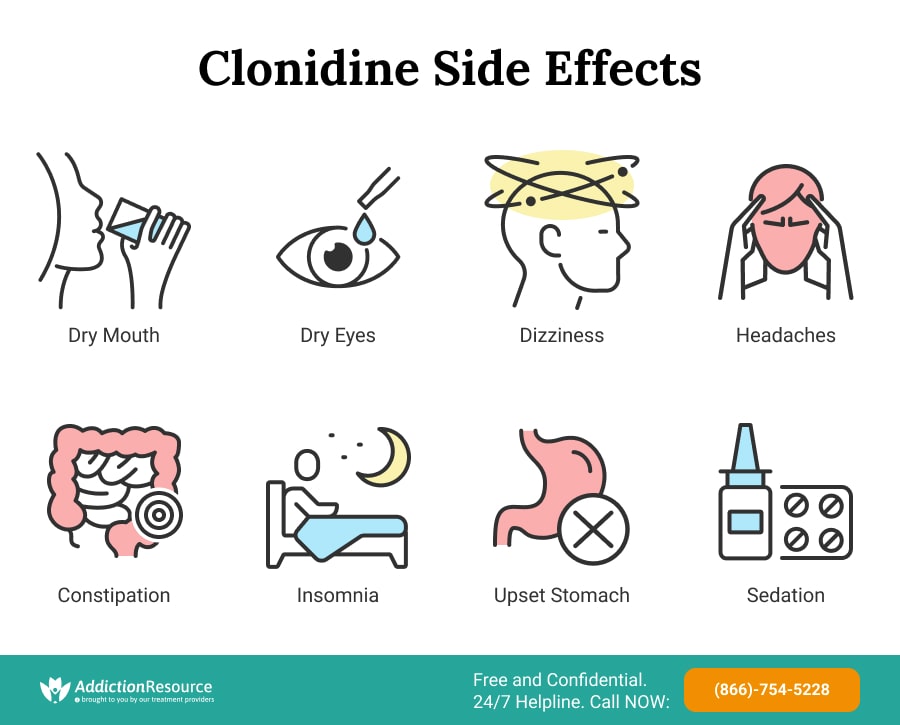There is the potential for many Clonidine side effects, especially when misused for the long term. While many of them pass with time, others will require immediate medical attention. In addition, since this is a drug that lowers the heart rate to achieve lower blood pressure, some patients can experience adverse effects even if they use the medicine as prescribed.
So, what are the Clonidine adverse effects? Is it safe during pregnancy? And how can it affect your weight?
Catapres Beneficial Effects
Clonidine is not an over-the-counter drug, and it can only be acquired through prescription. It’s most commonly used as a medication for hypertension/high blood pressure. Because of the way Catapres works, it can also be prescribed to patients dealing with intense symptoms of attention deficit hyperactivity disorder, commonly known as ADHD.
Although that’s the only two things it’s FDA approved for, some doctors also use it as a treatment for insomnia, as the drugs can induce sleepiness as well.
The Drug Has the Following Medical Effects on the Body:
- It works by slowing down the heart rate, which relaxes the blood vessels and lowers blood pressure
- It can affect the section of the brain that is responsible for controlling impulsivity and attention
- It helps relax the patient and improve their focus
What Are The Most Common Side Effects Of Clonidine?
Even though this is a very commonly prescribed drug, it does carry a risk of mild to severe side effects. These Clonidine effects are usually manageable but should be reported to the doctor if experienced.
The Most Common Ones Include the Following:
- Dry mouth and dry eyes
- Dizziness
- Tiredness
- Stomach upset or pain
- Sedation
- Constipation
- Headache
- Upper respiratory tract infection
- Feeling irritable
- Trouble sleeping
- Nightmares
One of the Clonidine side effects is the inhibition of the release of norepinephrine (NE). It decreases secretions from the salivary gland, causing dry mouth. It also decreases sympathetic tone, which explains constipation. Catapres sedative effect on users in the short-term causes drowsiness. Depression is also common.
Table Of Contents:
Rare Clonidine Side Effects
The patient using the drugs must have complete information about the rare side effects of Clonidine. These may seem like everyday things that happen to everyone in regular life. Still, if they hadn’t experienced any of them before and suddenly do, they need to relay this information to their doctor immediately.

The Uncommon Catapres Adverse Reactions May Manifest In the Following Ways:
- Bradycardia
- Blurred vision
- Hair loss or thinning of the hair
- Pale skin
- Muscle ache
- Joint pain
- Leg cramps
- Swelling of the breasts
- Loss of interest in sexual intercourse
- Inability to have or keep an erection
Although most of the mentioned side effects of Clonidine rarely occur, they may need medical attention.
The drug causes a decrease in heart rate that can result in bradycardia. Unfortunately, bradycardia can be life-threatening. If the heart cannot keep a rate that pumps enough blood, the brain and other organs in the body will become oxygen-deprived. It can cause other HCl side effects, including shortness of breath, chest pain, dizziness, fainting, fatigue, and weakness. In rare cases, when the slow heart rate goes undiagnosed for an extended period, it may cause complications such as high blood pressure, angina, and cardiac arrest.
Clonidine Weight Loss
Even though Catapres is usually associated with weight gain, some studies have also shown that the discontinuation of this drug can lead to Clonidine weight loss, too. This isn’t something that happens to everyone. Still, since there have been cases, it isn’t advised that this drug is prescribed to patients already dealing with anorexia nervosa.
Does Catapres Cause Weight Gain?
As an alpha 2-adrenergic agonist, which is Clonidine classification, there have been reports of weight-associated Catapres use. This effect was proved correct among patients diagnosed with anorexia.

Study results showed a significant increase in the body mass of all patients, though hunger and satiety sensations were not affected. Cessation of drug use resulted in a small but significant Clonidine weight loss. Still, these results suggest that Clonidine indications should not include anorexia nervosa.
Clonidine Pregnancy Risks
This drug and pregnancy can go well together. It does not cause hypotension in either mothers or neonates. No maternal adverse effects were associated with the drugs, too. Catapres is a safe antihypertensive agent in pregnancy.
The FDA listed it under category C. It means that the reproduction studies performed on animals have shown no evidence of embryogenic or teratogenic effects. Still, there are no adequate studies in humans yet. So, the risk of adverse Clonidine effects is still present, but generally, Clonidine pregnancy should be safe.
Is Catapres Safe While Breastfeeding?
First of all, this drug passes into breast milk. However, studies on the net effect of Catapres on nursing mothers and breastfed infants show mixed results. While most babies did not present with any adverse effects despite having nearly two-thirds of the serum levels of their mothers, one positive case has been documented.
The baby, whose mother was taking 0.15mg Clonidine daily during Clonidine pregnancy and postpartum, presented with drowsiness, hypotonia, and generalized seizures two days after birth. Episodes of apnea were also noted on the 5th day. Breastfeeding was stopped, and the symptoms resolved within 24 hours.
Catapres therapy can also affect lactation. In some cases, it has been reported a reduced milk supply in women who took the medication. Because of these possible Clonidine side effects in children and mothers, it is best to avoid Catapres while nursing.
Catapres Warnings
If a patient has noticed a hypersensitivity to this drug, it’s integral that they’re taken off the medication immediately. A medical health professional should do it as they will be able to adjust the treatment according to the patient and adjust the dose if they need to be tapered off slowly. That is because a sudden stop of using this medication may lead to adverse or rare Clonidine effects manifesting reasonably quickly.
Children taking this drug for treatment must be closely monitored to rule out hypersensitivity as well, as this is a drug that can cause severe adverse reactions.

There have been rare cases of after-effects as severe as sudden death caused by the withdrawal from Clonidine. That is why the patient must make sure they are sticking to the prescription, giving the appropriate information to their medical health professional about any after-effects they’re experiencing, and letting them lower the dose to taper off the drug safely.
It is also possible that the patient experiences a rise in blood pressure after taking the drug. In this case, the medical health professional might consider reintroducing the drug at a different dose.
The patient should always only take the amount of this drug that their doctor or medical health professional has prescribed to ensure health safety while using it.
How To Manage The Side Effects Of Clonidine?
More common and mild Clonidine adverse effects may go away after a few doses or within days because the body needs some time to get used to the drug. Lowering the amount or adding another one to counteract the side effect may be helpful. However, if the after-effects are prolonged and interfere with everyday life, it is best to consult a doctor immediately. Most likely, a new drug will be recommended.
Patients should also monitor drug interactions to prevent Clonidine adverse effects. They should present a complete list of all drugs and supplements being taken to the attending physician before taking this drug. Sometimes, Clonidine side effects in adults are caused by two or more drugs reacting negatively together. For example, Clonidine and Xanax can cause additive CNS and respiratory depression.
Vulnerability to Clonidine effects may also depend on personal, social, and environmental factors, including age, gender, diet, bad habits like smoking and alcohol intake, etc.
Getting Help With Abuse & Addiction
Clonidine is a drug that’s very effective against hypertension and for patients needing to manage the symptoms of ADHD. As long as the patient sticks to their prescription, follows all the doctor’s instructions, and reports any adverse reactions back to their doctor or medical health professional, this drug will be completely safe to use.
However, it also carries a risk of mild to severe adverse effects. Therefore, it’s essential that the patient has all the necessary information about their prescription and is told to make sure they’re only taking the prescribed dose, as the abuse (intentional or accidental) could lead to severe Catapres overdose or even death.
People who have used Catapres for an extended period, especially in high doses, may become dependent on the drug. Severe symptoms will require professional help. That’s why it is critical to address such symptoms with the professionals from the rehab for drug addicts. Such facilities will provide the needed level of care under individualized treatment for addiction.
Frequently Asked Questions
Does Clonidine Make One Sleepy?
Norepinephrine (NE) plays a massive role in the occurrence of rapid eye movement (REM) sleep, and Catapres reduces its release. Evidence shows that low doses of this drug can significantly improve REM sleep and decrease non-REM (NREM) sleep, where the deep sleep stage occurs. At the same time, the study suggests that a morning dose can produce profound sedation as a side effect of its use.
Does Catapres Cause Hair Loss?
Medications cause hair loss by interfering with the normal cycle of growth. The exact mechanism of hair thinning or hair loss during the use of this drug remains unknown. Still, it is reported that Catapres is linked to hair loss and its thinning.
Does Catapres Make One Tired?
Due to possible sleep disturbances at night and sedation during the daytime, some people feel fatigued. This can negatively affect school or work performance. However, in most cases, such unusual tiredness goes away in a few days.
Hope Without Commitment
Find the best treatment options. Call our free and confidential helpline
Most private insurances accepted
Page Sources
- Casper, R. C., Schlemmer, R. F., Jr, & Javaid, J. I. (1987). A placebo-controlled crossover study of oral clonidine in acute anorexia nervosa. Psychiatry research, 20(3), 249–260. https://pubmed.ncbi.nlm.nih.gov/3295935/
- Casper, R. C., Schlemmer Jr, R. F., & Javaid, J. I. (1987). A placebo-controlled crossover study of oral clonidine in acute anorexia nervosa. Psychiatry research, 20(3), 249-260. https://www.ncbi.nlm.nih.gov/pubmed/3295935
- Horvath, J. S., Phippard, A., Korda, A., Henderson-Smart, D. J., Child, A., & Tiller, D. J. (1985). Clonidine hydrochloride--a safe and effective antihypertensive agent in pregnancy. Obstetrics and gynecology, 66(5), 634–638. https://pubmed.ncbi.nlm.nih.gov/3903581/
- Drugs and Lactation Database (LactMed) [Internet]. Bethesda (MD): National Library of Medicine (US); 2006-. Clonidine. [Updated 2018 Oct 31]. https://www.ncbi.nlm.nih.gov/books/NBK501628/
- U.S. Food and Drug Administration, Catapres Label https://www.accessdata.fda.gov/drugsatfda_docs/label/2012/017407s037lbl.pdf
- Manzon L, Nappe TM, DelMaestro C, et al. Clonidine Toxicity. [Updated 2020 Jun 30]. In: StatPearls [Internet].; 2021 https://www.ncbi.nlm.nih.gov/books/NBK459374/
- Miyazaki, S., Uchida, S., Mukai, J., & Nishihara, K. (2004). Clonidine effects on all-night human sleep: opposite action of low- and medium-dose clonidine on human NREM-REM sleep proportion. Psychiatry and clinical neurosciences, 58(2), 138–144. https://pubmed.ncbi.nlm.nih.gov/15009817/
- Byrd, B. F., Collins, H. W., & Primm, R. K. (1988). Risk factors for severe bradycardia during oral clonidine therapy for hypertension. Archives of internal medicine, 148(3), 729-733. https://pubmed.ncbi.nlm.nih.gov/3341873/
- Miyazaki, S., Uchida, S., Mukai, J., & Nishihara, K. (2004). Clonidine effects on all‐night human sleep: Opposite action of low‐and medium‐dose clonidine on human NREM–REM sleep proportion. Psychiatry and clinical neurosciences, 58(2), 138-144. https://pubmed.ncbi.nlm.nih.gov/15009817/
- Carskadon, M. A., Cavallo, A., & Rosekind, M. R. (1989). Sleepiness and nap sleep following a morning dose of clonidine. Sleep, 12(4), 338-344. https://pubmed.ncbi.nlm.nih.gov/2762688/

 Authored by
Authored by  Reviewed by
Reviewed by 
